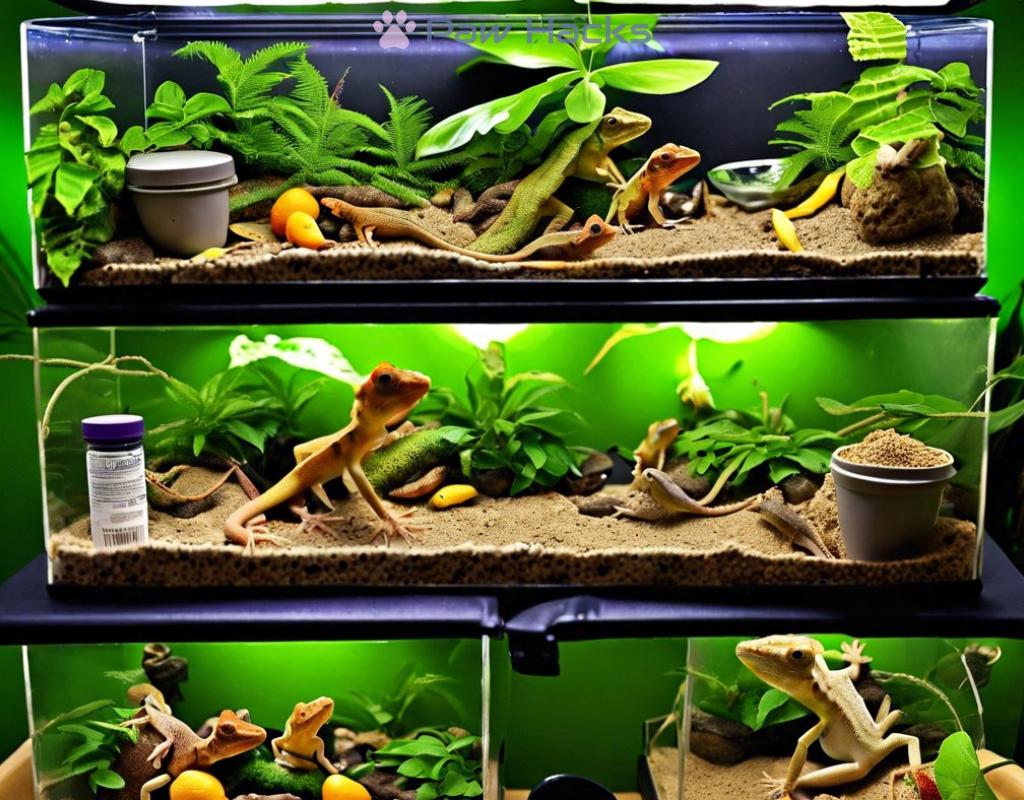Ideal Diet for Crested Geckos
The Essential Ingredients for a Happy and Healthy Crested Gecko

Crested geckos are fascinating creatures that thrive on a well-balanced diet. Providing the right nutrients is crucial for their growth, vitality, and overall wellbeing. This guide will delve into the essential ingredients that should be included in a crested gecko’s diet to ensure they are happy and healthy.
One of the key components of a crested gecko’s diet is protein, which is vital for muscle development and overall health. Additionally, calcium is crucial for bone health and metabolic functions. A diet that provides a blend of both will keep your gecko active and thriving.
- Protein Sources: Insects like crickets, mealworms, and roaches.
- Calcium Sources: Calcium supplements and calcium-rich fruits like figs and papayas.
Fruits are not just a treat; they are an essential part of your crested gecko’s diet. A variety of fruits provides vitamins and minerals that are crucial for their health. In addition, commercial crested gecko diets offer a balanced option that can be easily incorporated into their feeding routine.
Here’s a quick reference table of recommended fruits:
| Fruit | Nutritional Benefits |
|---|---|
| Figs | High in fiber and calcium |
| Papaya | Rich in vitamins A and C |
| Mango | Provides essential vitamins and hydration |
By mixing fresh fruits with commercial diets, you can create a delicious and nutritious meal that your crested gecko will love.
Unlocking the Secrets of Nutritional Balance for Your Crested Gecko
For a crested gecko to flourish, a diverse diet is essential. While protein and calcium are vital, incorporating a range of ingredients ensures that your pet receives all the necessary vitamins and minerals. A well-rounded diet not only promotes optimal health but also supports natural behaviors and activity levels. This diversity helps in mimicking their natural habitat, where they would encounter various food sources.
Feeding your crested gecko is more than just tossing in some insects or fruit. It requires thoughtful preparation to create a balanced meal. Start by rotating the types of protein and fruits to provide a rich array of nutrients. For instance, alternating between crickets and roaches can prevent dietary monotony and ensure that your gecko is constantly receiving different protein profiles. Additionally, incorporating calcium-rich supplements and fresh fruits like figs and papayas can help maintain a nutrient balance that is critical for their well-being.
Observing your crested gecko’s behavior and health can provide insight into how well their diet is serving them. Look out for signs of vitality, such as energy levels, skin condition, and appetite. If you notice any changes, it might be time to reassess their diet. Regularly consulting with a vet who specializes in reptiles can also guide you in making necessary adjustments to their nutritional plan. Remember, a happy and healthy crested gecko is a reflection of a well-balanced diet, so prioritize their nutritional needs for a thriving pet.
Feeding Frequency: How Often Should You Treat Your Crested Gecko?
Understanding the proper feeding frequency for your crested gecko is essential for their long-term health and happiness. A well-timed feeding schedule not only ensures they receive adequate nutrition but also helps maintain their natural behaviors. In this section, we will explore how often you should treat your crested gecko to keep them thriving.
Feeding your crested gecko on a consistent basis is crucial. Generally, adult crested geckos should be fed approximately every other day, while younger geckos require more frequent feedings to support their growth. This regularity helps mimic their natural feeding patterns, which can include daily foraging in the wild. By establishing a routine, you can also monitor their appetite and overall health more effectively.
As your crested gecko grows, their dietary needs will evolve. Hatchlings and juveniles, for instance, tend to have higher energy demands. Therefore, consider offering food daily or every other day for younger geckos, ensuring they’re getting the nutrients they need for proper development. On the other hand, adult geckos can thrive on a more spaced-out feeding schedule. It’s also important to observe their activity levels; more active geckos might require additional feedings.
In addition to adjusting feeding frequency based on age, note that seasonal changes can influence appetite. During warmer months, geckos may become more active and therefore require more frequent meals, while colder months might lead to a decrease in their food intake. Being attentive to these changes will help you adapt their diet accordingly and keep your pet in optimal health.
Regularly assessing your crested gecko’s health is vital for determining their feeding frequency. Look for signs such as weight fluctuations, energy levels, and skin condition—these can indicate whether their current diet is meeting their needs. If your gecko appears lethargic or is losing weight, consider increasing their feedings or consulting a veterinarian for tailored advice. Ultimately, a well-balanced diet, combined with the right feeding frequency, will lead to a more vibrant and energetic crested gecko.
The Ultimate Guide to Supplementing Your Crested Gecko’s Diet
While a well-rounded diet of protein, fruits, and commercial diets provides a solid foundation for your crested gecko, supplements play an equally crucial role in ensuring your pet receives all the essential nutrients. Supplements can bridge the nutritional gaps that may arise from a varied diet and help maintain your gecko’s overall health. In this section, we will explore the types of supplements available and how to effectively incorporate them into your crested gecko’s feeding routine.
When it comes to supplementing your crested gecko’s diet, it’s important to choose wisely. Here are some common supplements that can enhance their nutritional intake:
- Calcium Dust: This is vital for bone health and can be sprinkled on insects before feeding.
- Vitamin D3: Crucial for calcium absorption, this can be included in the calcium dust or given separately.
- Multivitamins: A balanced multivitamin supplement can provide a wide range of essential nutrients that may be missing from their regular diet.
- Probiotics: These can aid in digestion and improve gut health, which is essential for nutrient absorption.
Incorporating these supplements into your gecko’s diet can help ensure they are receiving a comprehensive array of nutrients that support their health and longevity.
To maximize the benefits of supplements, consider the following best practices:
- Frequency: Use calcium dust on prey items every other feeding, and provide multivitamins once a week to avoid over-supplementation.
- Application: Dust insects lightly before feeding to ensure your gecko consumes the supplements effectively.
- Observation: Monitor your gecko’s health and adjust the supplementation routine as needed, especially if you notice changes in appetite or energy levels.
By following these steps, you can create a balanced and healthful diet for your crested gecko, ensuring they thrive and remain active. Remember, supplementation should complement their diet, not replace it, so maintaining variety is key to their happiness and health.
Common Feeding Mistakes to Avoid for a Thriving Crested Gecko
One of the most common errors made by crested gecko owners is failing to provide a diverse diet. While it’s easy to stick with a few familiar foods, this can lead to nutritional deficiencies and health issues. Crested geckos, being omnivores, require a mix of proteins, fruits, and supplements to thrive. Relying solely on commercial diets or a limited selection of insects can prevent your pet from receiving the essential vitamins and minerals they need. Remember, variety is not just the spice of life; it’s a crucial part of your gecko’s wellbeing.
Another mistake is inconsistent feeding schedules. Crested geckos have specific feeding needs that change with their life stage. Hatchlings and juveniles need more frequent meals to support their rapid growth, while adults can typically be fed every other day. Ignoring these differences can lead to weight issues, lethargy, or even metabolic disorders. Establishing a regular feeding routine that aligns with your gecko’s age and activity level is vital for maintaining their health.
Finally, many owners struggle with the correct application of supplements. While supplements can greatly enhance your crested gecko’s diet, using them incorrectly can be detrimental. Over-supplementation, especially of calcium and vitamin D3, can lead to health complications such as organ failure or bone disease. It’s crucial to follow guidelines, such as dusting insects with calcium powder every other feeding and providing multivitamins weekly. Monitoring your pet’s health and adjusting supplement usage accordingly ensures that your gecko receives the benefits without the risks.
Share this content:



